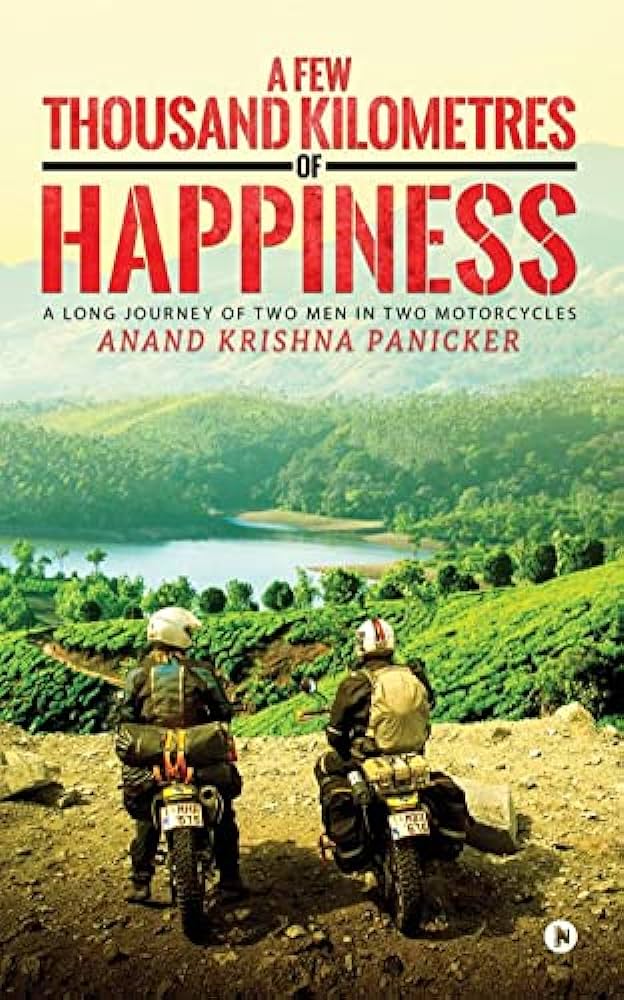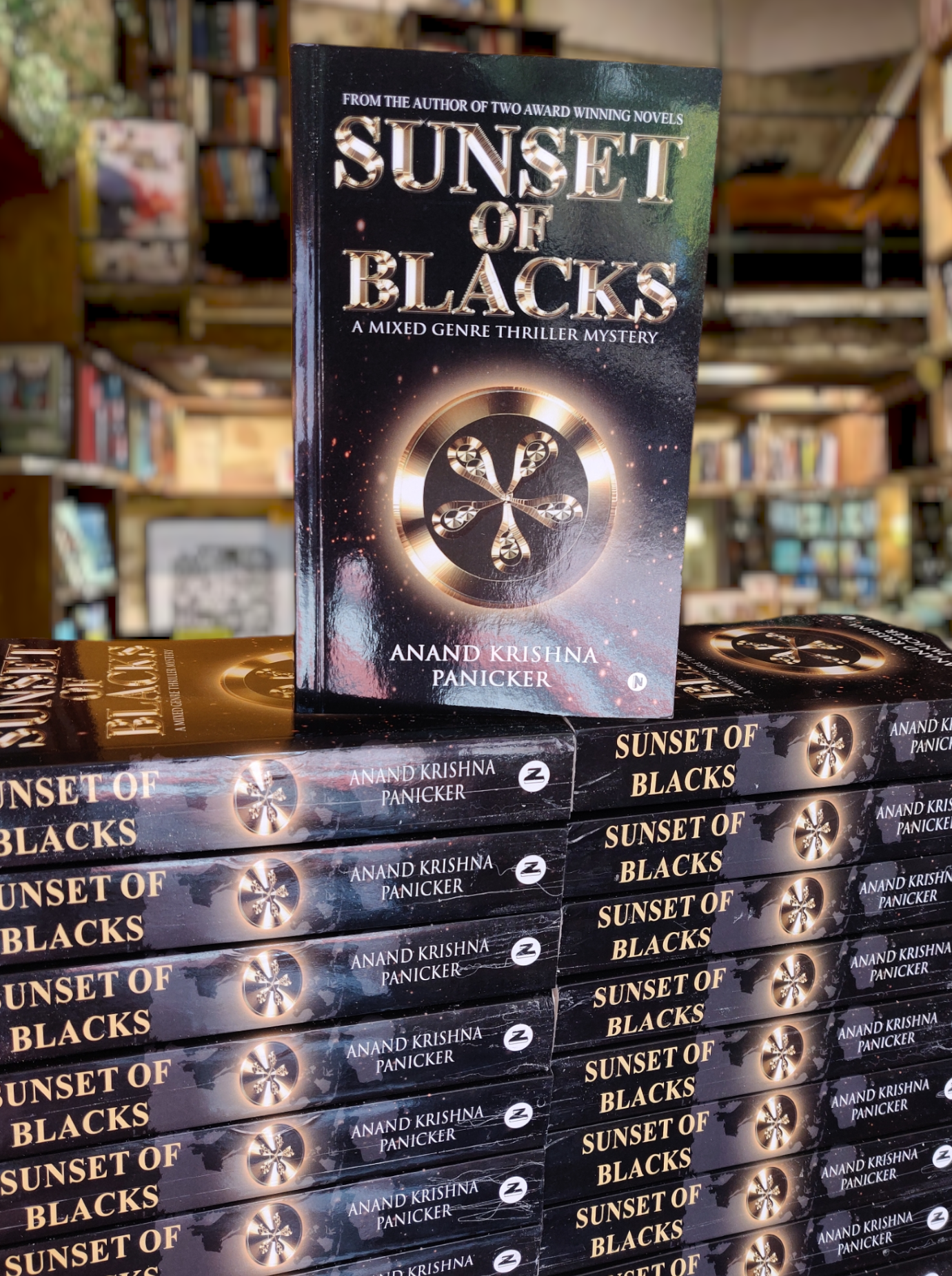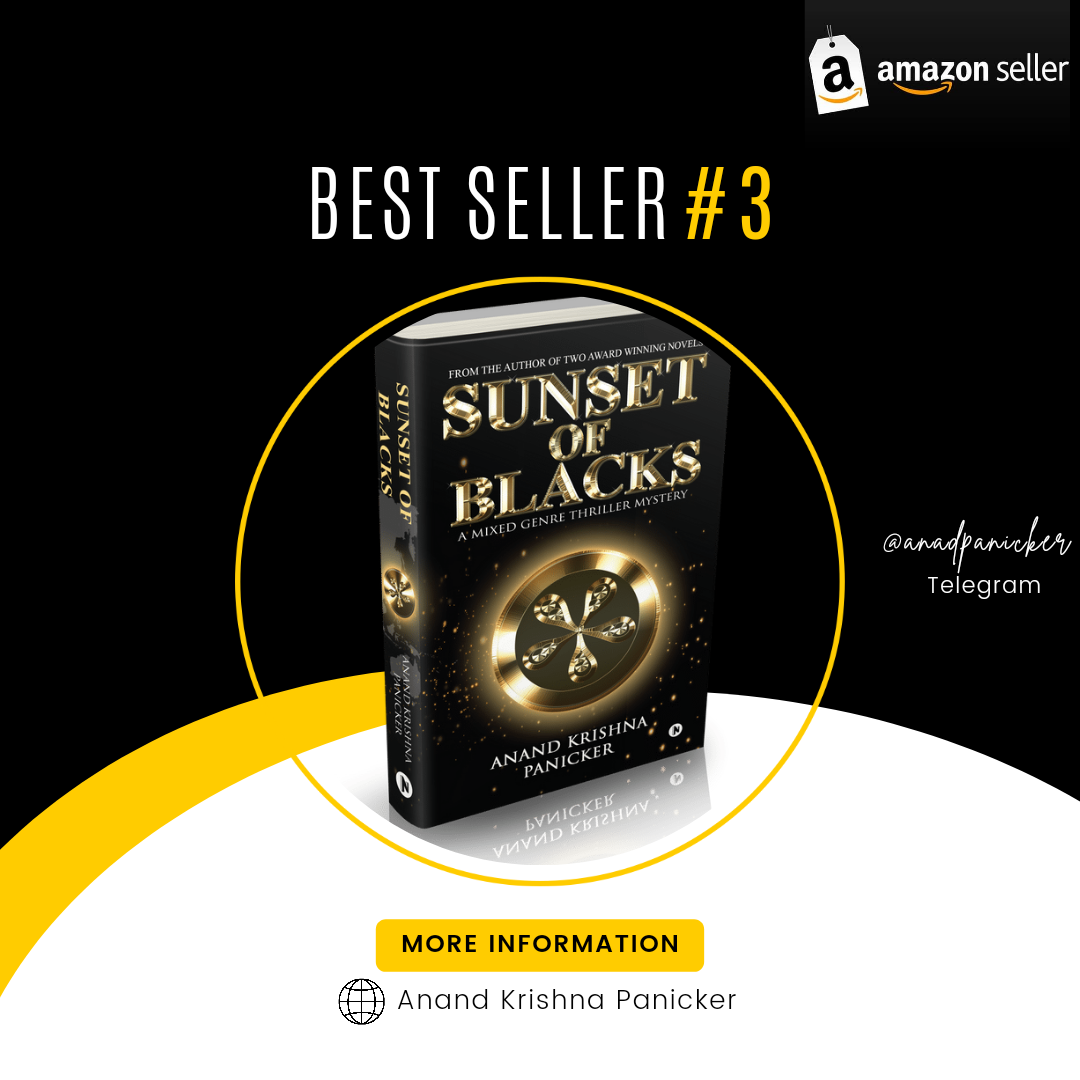Unveiling the Literary Universe of Anand Krishna Panicker: A Journey of Versatile Storytelling
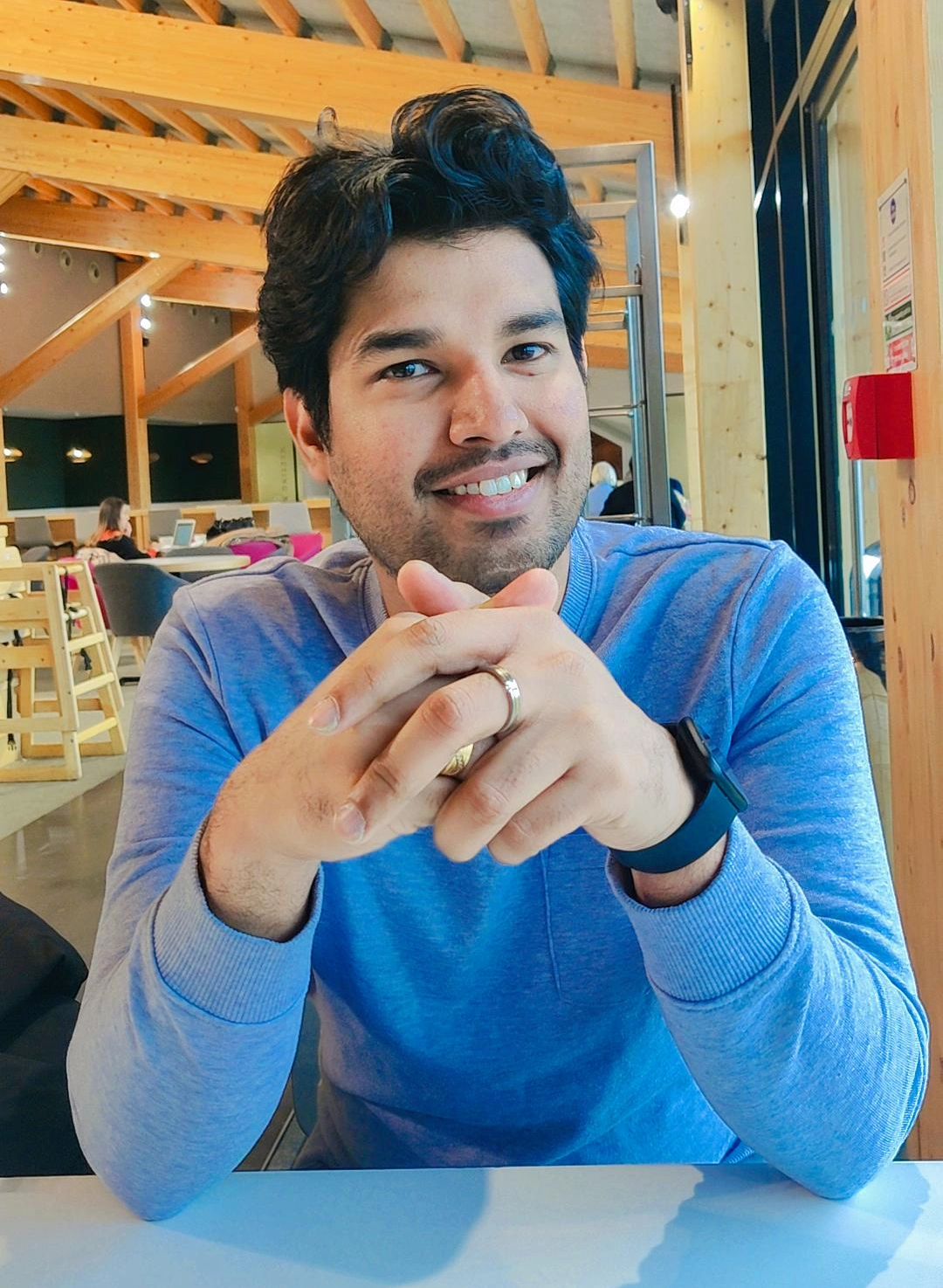
Ladies and gentlemen, bibliophiles and literary enthusiasts, it is a distinct pleasure to introduce you to a multifaceted and exceptionally talented author, Anand Krishna Panicker. Anand is an author whose literary prowess transcends genre boundaries, and his body of work is a testament to his remarkable versatility and storytelling abilities.
Anand Krishna Panicker is the creative mind behind three captivating books that have captured the hearts of readers worldwide. Each of these literary gems is a unique voyage into the realms of imagination, offering a distinctive experience tailored to a wide range of tastes and preferences.
Diversity is the hallmark of Anand's work, as his books traverse various genres, showcasing his ability to craft engaging narratives that captivate and resonate with readers from all walks of life. Anand's writings are a testament to his innate talent for storytelling, and his words have the power to transport readers to different worlds, evoke deep emotions, and provoke profound thought.
In the pages that follow, we will delve into the creative mind of Anand Krishna Panicker, exploring his inspirations, his creative process, and the rich tapestry of stories he has woven. Join us as we embark on a literary journey, unravelling the depths of his imagination and discovering the unique flavours of his storytelling. Whether you're a fan of mystery, romance, or the extraordinary, Anand's books have something special in store for you.
Get ready to be inspired, entertained, and enchanted as we delve into the captivating world of Anand Krishna Panicker, the masterful author behind three extraordinary books that are sure to leave a lasting imprint on your literary soul.
1. Tell us about yourself, how you developed your passion for writing, and what inspired you to become an author.
Anand. Allow me to introduce myself and the genesis of my passion for writing. From the earliest days of my childhood, the written word has been an integral part of my life's narrative. It all began with the simple act of penning letters, a practice that ignited the spark of creativity within me.
My journey as a writer was profoundly influenced by a remarkable figure in my life, Mr Haridas, my neighbour, whom I hold in the highest regard as my literary godfather. He had a penchant for gifting me books, each one unlocking a new world of knowledge and imagination. Mr. Haridas instilled in me the belief that every question posed could be met with an answer, found within the vast volumes of literature penned by individuals across the globe. In his wisdom, he often advised that if the answer eluded me, perhaps it was my destiny to craft a narrative and contribute to the collective wisdom of humanity. Thus, my path as an author was illuminated by this unwavering faith in the written word and the boundless curiosity that Mr. Haridas nurtured within me. His legacy continues to inspire me, driving me to explore the uncharted realms of storytelling and share my unique perspective with the world.
2. Tell us about your first published book. What was the journey like?
Anand. My debut published work, 'A Few Thousand Kilometres of Happiness,' represents a unique journey in itself. Initially conceived as a travel blog, it gained unprecedented traction in 2016, quickly going viral. The overwhelming response and persistent requests from my online subscribers compelled us to transform it into a full-fledged travelogue, enriched with captivating visuals.
The book made its humble beginnings through Amazon KDP, where it began to garner attention and achieve record-breaking sales. As its popularity continued to soar, we were fortunate to secure the support of a literary agent and an investor. Their invaluable assistance further propelled our publishing efforts.
The culmination of these efforts was nothing short of remarkable. 'A Few Thousand Kilometres of Happiness' achieved the distinction of reaching the #1 spot in Amazon's sales rankings and garnered a prestigious national award. The journey was undoubtedly challenging, and filled with risks and uncertainties. However, in hindsight, I can confidently assert that every trial and tribulation along the way was unquestionably worth the reward.
3. Please tell us what you enjoy most about writing. What is your favourite part of being a writer?
Anand. What I enjoy most about writing is the ability to immerse myself in the creative process and craft worlds and stories. It's like a journey where I get to explore the depths of my imagination.
My favourite part of being a writer is the unique power it grants me to transport readers into the worlds I've either lived or created, allowing them to experience it first-hand. It's a remarkable opportunity to influence their thoughts and feelings and challenge their perspectives on various aspects of life. To me, writing is more than a passion; it's an essential part of my existence. I find solace in scribbling my thoughts during my free time.
My journey into writing has been marked by twists and turns. From a young age, I aspired to become an author, but after completing my schooling, I encountered a change of heart. I discovered a new passion for physics and electronic circuits. This realization left me in a state of confusion. On one side was my unwavering love for literature, and on the other, the world of engineering beckoned. Ultimately, I decided to pursue engineering and declined admission offers from English literature colleges. It was during my undergraduate years at an engineering college that my path took unforeseen turns, leading me to leave my home. These experiences and the unexpected events that unfolded are chronicled in my autobiography. To avoid spoiling the suspense for those yet to read it, I won't divulge the details here. Despite these changes in direction, one thing remained constant: my urge to write. Writing, to me, is as essential as breathing. It's something I make time for, no matter how demanding my engineering career can be.
For me, the best part of being an author is the enduring legacy I can leave behind. Through my books, I can etch my thoughts, feelings, and experiences into history. Even after I'm no longer in this world, my work and dedication will continue to resonate with readers. Every book serves as a portal to the author's mind, and through my books, my mind will live on, ensuring that my presence endures, long after my physical presence has faded.
In essence, writing allows me to transcend time and connect with readers across generations. It's a remarkable and gratifying journey, and I'm deeply passionate about sharing it with the world.
4. What have you found to be most challenging about writing?
Anand. The aspects of writing that have posed the greatest challenge for me are crafting the beginnings and climactic moments of my narratives. I have an innate tendency towards perfectionism, which often compels me to revisit and revise these critical junctures numerous times.
This challenge was particularly pronounced during the creation of my magnum opus, 'Sunset of Blacks.' Crafting the opening and climax of such an ambitious work demanded meticulous attention and refinement. In contrast, my other two books, which are essentially autobiographical accounts, flowed more seamlessly as they drew from my personal experiences and life stories.
5. Have you ever experienced writer’s block? How did you deal with it?
Anand. Yes, I encountered writer's block during the creation of my third book, "Sunset of Blacks." This particular work presented a unique challenge due to the intricate technicalities woven into its storyline. The research and study required for this book spanned over a period of approximately five years. What added to the complexity was the narrative style I employed—a non-linear approach with multiple viewpoints. This made it particularly tricky to decide on the precise beginning and ending of each chapter.
To combat writer's block, I've developed a personal routine. When I find myself stuck in a creative impasse, I step away from my writing desk and retreat to my balcony. There, I gaze at the towering trees in the distance, savouring a steaming cup of coffee. The fresh air and change of scenery often help clear my mind. In cases where the block lingers, I opt for a soothing hot shower. This practice has proven to be incredibly refreshing for my mind and helps me break free from the creative constraints that sometimes hinder the writing process.
6. What do you like to do when you’re not writing?
Anand. When I'm not engrossed in the world of writing, I find immense pleasure in reading. Currently, my literary tastes lean toward non-fiction. I have a profound interest in delving into the lives of historical figures, exploring intriguing crime stories, and diving into various case studies. Moreover, psychology has become a particularly captivating subject for me. The workings of the human brain, with its infinite possibilities, have me captivated. I'm fascinated by the diversity in how individuals perceive each other and the decisions that shape their lives. The intricacies of the human mind are truly remarkable. Research, in fact, has transformed into my favourite pastime. I'm constantly driven by an insatiable curiosity to know more about the world through the pages of books. I wholeheartedly believe that delving into a new book each day can profoundly alter one's perspective of the world, revealing its intricate and multifaceted nature. So, when I'm not writing, you can often find me immersed in the pages of a book, embarking on yet another intellectual journey.
7. What is your real-life work schedule like when writing? How many hours a day do you write?
Anand. In my daily life, I maintain a full-time work schedule, dedicating eight hours a day to my primary occupation. However, my passion for writing never truly rests. I make it a point to set aside at least 20 to 30 minutes each day for some form of creative scribbling. These brief sessions help me capture ideas, concepts, or snippets of stories as they come to mind.
When these fragments evolve into a coherent plot or concept for a book, I commit more time to the writing process. At this stage, I typically allocate around an hour each day to nurture and develop the material. Most of my initial writing sessions occur on my mobile device, where I jot down ideas and send them to my personal email account. Later, when I have more extensive blocks of time available, I transform these electronic notes into formal Word draft documents, gradually shaping them into complete works. This balance between my full-time work and my writing endeavours allows me to continuously feed my creative spirit.
8. Where do you get your ideas for your books?
Anand. I've often found that the wellspring of ideas lies in our own questions. I'm a prolific self-questioner, and I engage in inner dialogues regularly. It's within these conversations with myself that many of my book ideas take shape. addition to introspection, I place immense value on communication. I make it a point to engage in conversations with a wide range of people. To facilitate this, my social media management agents have played a pivotal role in creating a vibrant Instagram account that enables me to interact with my readers and a diverse audience. The act of conversing with people offers a fascinating window into the diverse ways individuals think and perceive the world. This deep understanding of different thought processes often serves as a wellspring for crafting new and intricate characters that are well-suited to the stories I wish to tell.
In my case, I must admit that I'm not particularly adept at writing fiction, and as a result, many of the incidents in "Sunset of Blacks" are rooted in true stories. For readers who delve into the depths of history, seeking to unearth the underlying truths behind each event, there are often intriguing clues waiting to be discovered. Many of my readers have embarked on this investigative journey, unravelling the factual inspirations behind the narrative. It's a testament to the power of curiosity and the symbiotic relationship between writer and reader.
9. What does literary success look like to you?
Anand. I write because it's an ardent passion of mine, and not with the primary goal of financial gain. However, it's heartening to see that my books have resonated with a broad spectrum of readers, leading to strong sales and a loyal following. I'm grateful to receive numerous emails and online messages from readers who have been touched by my works.
To me, literary success transcends monetary achievements. It's about the impact I have on people's lives. If even one person in this vast world feels joy, and amusement, or is transported into a world of beautiful imagination through my books, that's my ultimate measure of literary success. Success, in essence, is a matter of perspective, and I believe I'm currently living the most fulfilling and rewarding days of my life.
10. What kind of research do you do, and how long do you spend researching before beginning a book?
Anand. As I mentioned earlier, every book I undertake is akin to a project, and I don't adhere to rigid timelines when it comes to my writing process. My approach is to dedicate as much time as necessary to research and refine the work, regardless of any time constraints. This perfectionist mentality, while demanding, is essential to ensure that I have complete confidence in the quality of my own work. After all, if I'm not assured of the value of my book, how can I expect someone to invest their hard-earned money in it?
For my book, 'Sunset of Blacks,' I committed several years to intensive research. This involved extensive discussions with experts in various fields, including science, forensics, and the defense sector. I also sought insights from medical students and dentists to gain a deep understanding of dental profiling, a critical element in one of the chapters of this particular novel.
My readers are incredibly discerning and brilliant, and I hold myself to a high standard when writing for them. Crafting a book that meets their expectations is a challenging endeavour, and it's not as straightforward as it might initially appear.
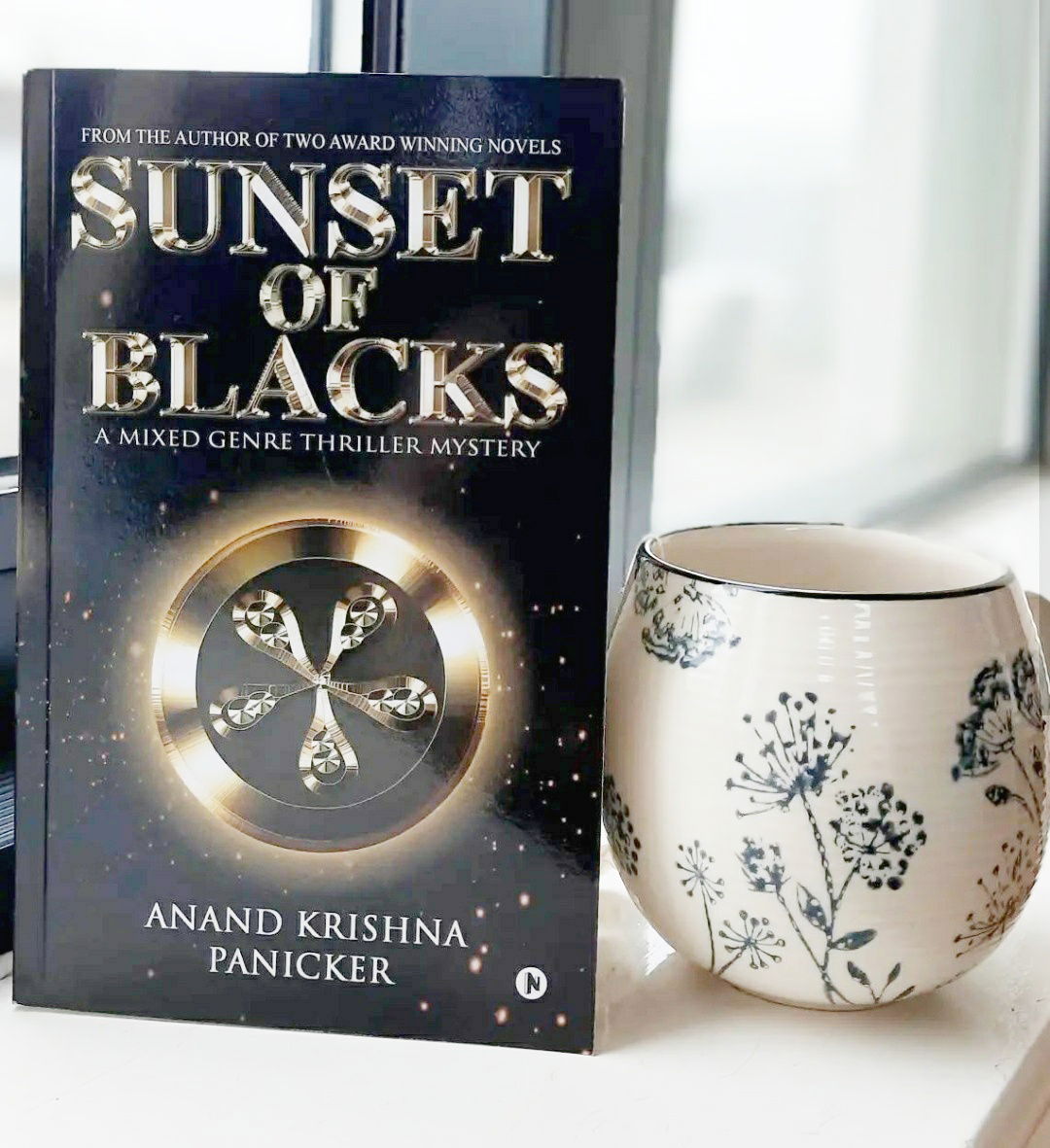
11. What are your favorite literary journals? Share some of your favorite books with our readers.
Anand. One of the books that currently captivates my attention is 'The Science of Mind' by Ernest Shurtleff Holmes. This book, in particular, delves deeply into the subject of the human brain, and I find it immensely compelling.
As for literary journals, I'm fond of revisiting books from the 1960s and earlier. The vintage literature from this era not only provides a historical perspective but also offers profound insights into the evolution of human thought and understanding. These books hold a unique charm, and I believe that they continue to be a valuable source of knowledge and inspiration for readers seeking to explore the intricacies of the human mind and the world at large.
12. Do you read your book reviews? How do you deal with them, whether they are positive or negative?
Anand. Occasionally, I do come across book reviews, particularly when readers send them directly to me or tag me on various online platforms where I'm active. When I receive a notification about a review, I typically take the time to read it.
It's important to note that I don't categorize reviews as either good or bad. Instead, I view them as reflections of individual perspectives. For instance, in the case of my third novel, which blends multiple genres and delves into physics, readers' opinions can vary widely. A reader with a deep aversion to physics might find the technical explanations excessive and unnecessary. However, a physics enthusiast could relish these intricacies and appreciate them.
In this light, I believe that there are no inherently good or bad reviews. They are expressions of personal opinions and preferences, each contributing to the broader tapestry of reader reactions to my work. I value the diversity of perspectives and use them as insights into how different readers engage with my writing.
13. Do you try more to be original or to deliver to readers what they want?
Anand. Through my years in the literary world, I've come to realize that there is an audience for every book. The key is to connect with the right readers. Some authors may discontinue writing in specific genres, such as romance, citing it as outdated or too cliché. Similarly, I've received reviews suggesting that my second book, an autobiography, falls into a cliché category. However, these observations haven't hindered the journey of my books. They have continued to find appreciation from readers, and love has poured in from various parts of India.
What I've learned is that every genre has its dedicated readership, and as authors, our role is to create the work and bring it to the right audience. When the book reaches its intended readers, it often receives a warm and celebratory reception. I frequently receive emails and messages from readers seeking book recommendations, demonstrating their eagerness to explore new literary journeys. It's a testament to the enduring appetite for diverse and engaging stories.
So, I don't write what readers want, but readers often find what they want in what I write.
14. What might your next book be about? Please provide information about the books you have published as well.
Anand. I'm currently in the planning stages for two upcoming books. The first project will be the second part of 'Sunset of Blacks.' It will continue the narrative from where the previous book left off, delving deeper into the intriguing storyline.
The second book in progress is a family-oriented romantic comedy with a self-help twist. It's designed to bring a blend of humour and valuable insights into readers' lives, creating a heartwarming and entertaining experience.
As for my existing publications, I have three books currently available. These books span across various genres, reflecting my diverse interests and storytelling capabilities. Each of them offers a unique literary journey that caters to different tastes and preferences.
15. I've had the opportunity to read your book "Sunset of Blacks," and I thoroughly enjoyed it. It falls into the mixed genre thriller mystery, which I found both refreshing and captivating. I'm curious about your choice of this particular genre—what inspired you to explore it?
Anand. I'm delighted to hear that you enjoyed "Sunset of Blacks," and I appreciate your kind words. This novel holds a deeply personal connection to my life, and the storyline feels as though it has been intertwined with me since my childhood. However, I grappled with the question of how to bring it to life.
The messages conveyed through 'Hermes Sunrays Radio' within the book were something akin to a conversation within my own mind—a manifestation of thoughts I've carried with me for a long time. The narrative of the story is highly metaphorical, and a close examination of the names of characters and places reveals layers of meaning. Many readers find themselves returning to the novel, delving into its intricacies once they've uncovered the twists at the end.
The library mentioned in the story is a place of personal significance to me, as it was both a part of my upbringing and a location where I worked on various projects. Interestingly, the story led me on a journey across the world as I worked on its intricate plot, and some of the twists within the chapters were inspired by my own dreams. The entire experience of crafting this novel was truly remarkable, and that's why I consider it my magnum opus. It's a story that resides deep within me and has, in a sense, compelled me to travel the world in its creation.
I would like to humbly express my sincere gratitude for the generous time you dedicated to our conversation. Our discussion regarding your journey as an author and the insights into your upcoming books has been nothing short of remarkable. I would also like to extend my heartfelt appreciation to Mr. Haridas, whose encouragement and support have introduced an exceptional author to us.
The sheer brilliance of your extensive research in "Sunset of Blacks" shines brightly through its pages. Your profound passion for physics is unmistakably woven into the fabric of the book, evident in the meticulous attention to even the most minute details.
As you embark on your future literary endeavours, please accept my warmest and sincerest best wishes. I am confident that your unique perspective and extraordinary storytelling abilities will continue to captivate and profoundly influence readers, just as they have for me. Your contributions to the literary world are destined to leave an indelible mark.
Once again, I wish to convey my deep appreciation for your invaluable insights and for generously dedicating your precious time to engage in this enlightening conversation. Thank you.
Connect With Author Anand Krishna Panicker:
Instagram: https://www.instagram.com/anandkrishnapanicker/

